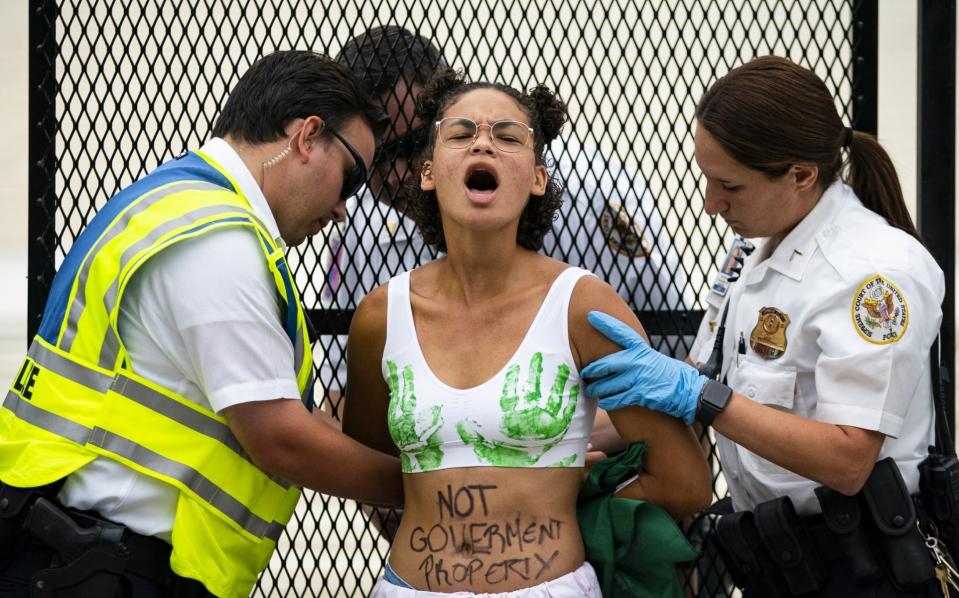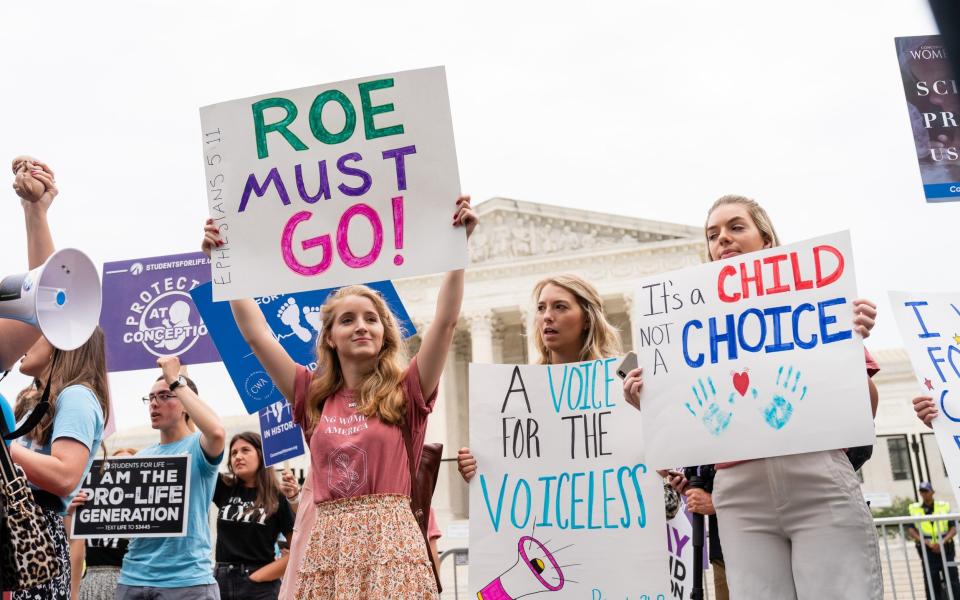Roe v Wade: What is the Supreme Court abortion ruling and why has it been overturned?

America's Supreme Court has struck down its landmark 1973 Roe v Wade ruling granting women a constitutional right to an abortion.
But what is Roe v Wade, what impact will the Supreme Court’s decision have, and why is all this happening now? Here’s a brief guide to one of the most polarising subjects in US politics today.
What is Roe v Wade?
In 1973, the Supreme Court, in the case of Roe v. Wade, ruled that the 14th Amendment to the US Constitution provided a fundamental right to privacy that protects a woman’s right to abortion across the country.
The high court reaffirmed those abortion rights in the 1992 Planned Parenthood v. Casey decision that said abortion restrictions cannot place an “undue burden” on the right.
The Roe and Casey decisions determined that states cannot ban abortion before a foetus is viable outside the womb, generally viewed by doctors as between 24 and 28 weeks.
There is no federal law guaranteeing the right to abortion in the United States, with rules varying from state to state.

Why is Roe v Wade being overturned now?
The state of Mississippi wants to ban abortions from 15 weeks onwards - Dobbs v. Jackson Women's Health Organization - a law previously blocked by lower courts as clearly in violation of the Roe v. Wade precedent.
The Supreme Court has now ruled that the ban can go ahead, striking down Roe v Wade in the process.
That has been made possible by the 6-3 conservative majority on the court, with three hawkish justices nominated under Donald Trump.
In the 2016 election campaign, Mr Trump vowed to nominate Supreme Court justices who would be prepared to strike down Roe v. Wade.
What will happen next?
The country's highest court has ruled that abortion laws should instead be made by each US state, leaving a patchwork of restrictions across the country.
With Roe v Wade no longer the law of the land, 26 US states are likely to move to quick ban abortion, according to the pro-choice Guttmacher Institute.
They include 13 states which have so-called "trigger laws" in place that are designed to rapidly enact stringent restrictions in the event that Roe v Wade no longer applies.
Those states are: Arkansas, Idaho, Kentucky, Louisiana, Mississippi, Missouri, North Dakota, Oklahoma, South Dakota, Tennessee, Texas, Utah, and Wyoming.
Half of American women risk losing abortion access without Roe v Wade, according to a New York Times analysis.
They could now face the choice of having a potentially dangerous illegal abortion, traveling to another state where the procedure remains legal and available or buying abortion pills online.
Some states intend to ban abortions from the point of conception, while others want to ban the procedure once cardiac activity is detected, roughly around six weeks, and before many women know they are pregnant.
Some Republican states have also moved to crack down on allowing medication abortions to be delivered by mail.
None of the bans prevents an abortion where necessary to save the life of the mother, but some do not make the same exception for cases of rape or incest.
Will women be criminalised for getting an abortion?
Leaders of the anti-abortion movement have not advocated for criminal penalties for women who receive abortions. However, the idea was briefly mooted by lawmakers in Louisiana, who put forward a bill that would see women face murder charges. The bill failed to advance.
Most criminal laws relating to abortion bans instead target the providers, for instance the doctor who performed the procedure, or the clinic it was done in. Some go as far as holding taxi drivers who dropped women off at an abortion clinic liable.
Where will abortion rights be protected?
Just as Republican-controlled states have moved to enact restrictions on abortion access, Democrat states have acted to preserve or expand access in their states.
In New York and California, lawmakers have moved to expand abortion care, while Connecticut has passed a law to protect providers from lawsuits in states where abortion is banned.
These states are preparing to be so-called "safe havens" for patients in states where abortion is no longer legal, and are bracing for a potential influx of demand for the procedure.
Democrats have attempted to codify Roe v Wade by drafting legislation called the Women's Health Protection Act, but a vote in May failed to pass the required 60-vote threshold needed by 49-51 votes.
With the party likely projected to lose control of Congress in November, it is unlikely any future efforts will prevail. There are also legal questions about whether it would be constitutional for Congress to use legislation to effectively overturn the Supreme Court's interpretation of the US Constitution.
What do ordinary Americans think about abortion?
There were more than 930,000 abortions in the United States in 2020, according to the latest statistics from the Guttmacher Institute.
More than 60 per cent of Americans believe abortion should remain legal in all or most cases, according to the Pew Research Center.
But the survey showed a stark political division, with 80 per cent of Democrats believing abortion should remain legal in all or most cases, compared to 35 per cent of Republicans.

 Yahoo News
Yahoo News 